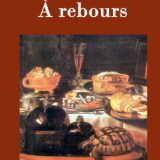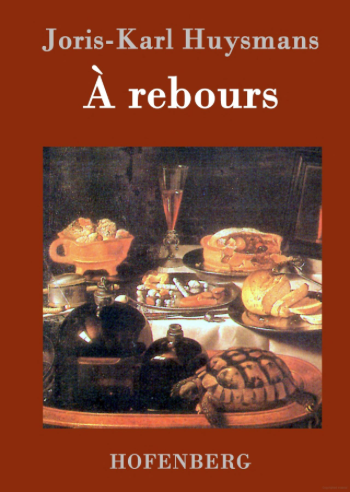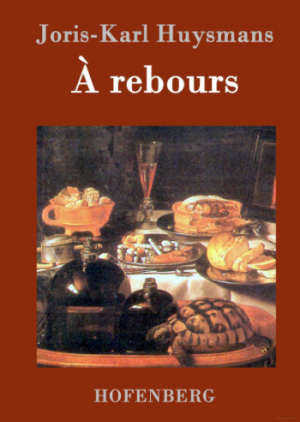Against the Grain / À Rebours – Joris-Karl Huysmans – 1884
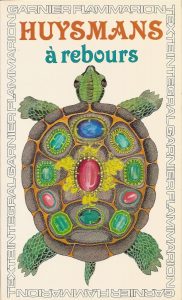
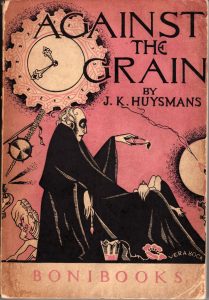
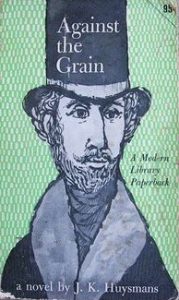
Posted by joffre on 5/12/2013, 21:49:13
I finished A Rebours about a week ago. I know it was a book club selection before I came to the site. I haven’t read the discussion. I enjoyed the book though. It somewhat satisfied my craving for something different. I sometimes wondered why or how it was interesting. I suppose all the catalogs just worked to elaborate a rather fascinating character. The aborted trip to England was quite amusing. I would like to know how Des Esseintes life went after returning to the world.
I read La Bas some years ago. I don’t remember much about it. A Rebours has made much more of an impression, but I wish I had La Bas with me to reread.
Now I’m reading Still Life by A.S. Byatt. After enjoying Possession so much, it took me thirteen years to decide which other Byatt book to read. Every one I looked at turned me off somehow. I don’t really remember what made me choose to start with The Virgin in the Garden and then read the sequel Still Life. I think I read something good about Still Life. TVitG took a while to catch my interest but I enjoyed it well enough. SL has been interesting enough from the beginning, probably because I already knew the characters, but if it doesn’t come a lot closer to Possession than TVitG, I might not go on with the series.
~
Posted by Lale on 7/12/2013, 15:22:55, in reply to “a rebours”
I couldn’t finish A Rebours (Against the Grain??) although I read more than half of it. I thought what the guy was doing was stupid and crazy. What a waste of money and life.
What did you think about the turtle who died under the weight of the expensive jewels glued on its shell?
Lale
~
Posted by joffre on 8/12/2013, 9:50:13, in reply to “Re: a rebours”
Did you read about the turtle in the introduction or notes? Possibly you had a different edition. The turtle was based on a real episode. It was owned by some Montesquieu. Zola confessed to what he called the bourgois concern about its crapping on the floor.
I sympathize with Des Esseintes, perhaps with the decadents in general. I haven’t read it, but supposedly in the play Axel by Villiers de L’isle Adam there’s a line that says, “As for living, our servants can do that for us.” Life is a pain; the more one can avoid it in pleasant circumstances, the better. It’s not as if Des Esseintes has never been in it. He was. He found it empty and vulgar, and tried to get out.
~
Posted by joffre on 8/12/2013, 18:28:48, in reply to “Re: a rebours”
By the way, that turtle seems to have found his way into one of the Harry Potter books. I found mention of it online while trying to see how to spell Montesquieu.
~
Posted by Lale on 8/12/2013, 21:56:33, in reply to “Re: a rebours”
Very interesting. No I had not read about the turtle. I love these kinds of trivia and connecting the dots. How these things connect with other things and give material to MA students. I am just researching something in the Ottawa U online library and, oh my, the thesis that have been written on “connections.” I can imagine a dissertation on common symbolism in A Rebours and Harry Potter.
Lale
~
Posted by guillermo maynez on 9/12/2013, 13:09:43, in reply to “Re: a rebours”
Des Esseintes is loosely based on a real-life character, Baron Robert de Montesquiou (this is the correct spelling, different from the famous philosopher Charles de Secondat, Baron de Montesquieu). Interestingly enough, this Montesquiou is also the model for a more famous character, Proust’s Baron de Charlus.
“A Rebours” was for me an invaluable discovery, thanks to none other than Lale. It is a wonderful book about French decadentisme, but more than that, an incredible fantasy about alternatives to the vacuity of life, an Existentialist precursor, an exercise in eccentricity, a catalog of wonderful curiosities, a desperate cry against the lack of meaning of life, etc. I enjoyed it a lot.
~
Posted by Lale on 27/5/2003, 12:02:29
I am on page 80 and I am hating every page of it. I decided not to push it any more.
A Rebours, Against the Grain, Against Nature, or whatever it is called, has been recommended by my French grammar teacher. I had great hopes. Somehow it did not work for me.
I just want to quote here the author himself:
“It will be the biggest fiasco of the year – but I don’t care a damn! It will be something nobody has ever done before, and I shall have said what I had to say.”
It certainly is the biggest fiasco of the year for me. And I agree that it is something nobody has ever done before.
Posted by Anna van Gelderen on 27/5/2003, 18:53:08
“The age of nature is past; it has finally exhausted the patience of all sensitive minds by the loathsome monotony of its landscapes and skies.” Thus spoke Jean des Esseintes, protagonist of Against the Grain.
For most people it will be difficult to see the personality of Des Esseintes detached from the literary qualities of the book. If you find Des Esseintes loathsome it is hard to like the book. If you find Des Esseintes a marvellous fellow you are bound to love the book. Most of the book is little more than an elaborate catalogue of Des E’s tastes in for instance literature (ancient and modern), painting, decorating, liqueurs and flowers. His taste veers toward the obscure, the obscene, the grotesque and the morbid. It deliberately shies away from the modern and the commonplace.
Des Esseintes leads a virtual life, as we would call it now. He lives entirely through other people’s creations. His own attempts to create something are as doomed to failure as his rather comical attempt to make a trip to England. The tortoise that is to go so nicely with the carpet takes a few tottering steps and then collapses under the weight of the jewels: dead as a doornail. The grotesque plants that are to be the finishing touches to his house die soon.
As appears from the quote at the top Des Esseintes’s take on life is, that the idea of a thing is superior than the thing itself: the artificial is an improvement of and is to be preferred above the natural. In the end Huysmans apparently thinks that this view cannot be sustained. He has Des Esseintes fall ill, upon which he is ordered by his doctor back to Paris, to give up his unhealthy seclusion and take part in real life again.
I read this book with an odd sort of fascination – or maybe, intellectual curiosity would be a better word. I have very little in common with Des Esseintes (as I wrote to Len earlier: he is just about as alien to me as a Klingon), but I was interested in finding out what makes him tick, just as I would like to find out more about a very odd and rare animal. Unfortunately I did not get any closer to Des Esseintes. To be honest, in the end I just wanted to kick the guy’s butt and tell him to stop being such a whimp.
Does the book have artistic merit? Certainly it must have been a courageous book to write in an age when chairs wore pleated skirts to cover their legs. It was also innovative, original and influential. Oscar Wilde, for instance, was much impressed by it and reputedly used Des Esseintes as an inspiration for his Dorian Gray.
Did I find the book an interesting read? Yes, up to a certain point (see above).
Would I recommend this book to my friends? No, they would never forgive me 😉
Posted by len on 27/5/2003, 20:52:59
Anna quite well captures the essence of my reaction to this book as well. I am as much puzzled by my morbid fascination with it as with its reputation. Perhaps the French of the original is exceptionally elegant or something, which would be a reasonable inference from the English translation, which manages to sustain one’s interest (such as it is) despite the “phone book” ambience of most of the substance. I really can’t explain why I was able to finish it. I am reminded of the long sequences of who begat whoms in the Old Testament.
I also suppose that were one to make the effort to become acquainted with the work of the plethora of artists cited by our preciously opinionated protagonist, one would be staggeringly, if uselessly, well “educated”.
A unique experience.
~
Posted by Howard on 27/5/2003, 21:07:08
: I also suppose that were one to make the effort to
: become acquainted with the work of the plethora of
: artists cited by our preciously opinionated
: protagonist, one would be staggeringly, if uselessly, well “educated”.
That was my feeling too. Perhaps those with an in depth knowledge of these artists and their works might get more out of this book.
A Rebours was an unusual but interesting book to read. However it was only my interest in the period the novel was set, the flashbacks to Des Esseintes previous life and curiosity about what he was trying to achieve that encouraged me to finish it. In the earlier chapters, I too Lale, was tempted to give up. However after the visit to the dentist and the Auguste Langlois chapter I thought the novel might get better.
It is the sort of book that I would reccommend only to students of 19th century French literature and those with the money and inclination to live the life of a wealthy 19th century recluse.
~
Posted by moana on 27/5/2003, 21:49:44
Ay, indeed, I tired quickly of this book. It seemed like list upon list of obscure things, books,jewels, etc… GAH! I tried to skim past the “listy” part, and ended up at the back of the book, wondering if there was a plot or whether this was a grocery list of ideas…
Sure, there is the tie always between artificiality and reality, but this focus of the book reads like it is deliberately trying to work on a “literary level”.
: Most of the book is little
: more than an elaborate catalogue of Des E’s tastes
: in for instance literature (ancient and modern),
: painting, decorating, liqueurs and flowers. His
: taste veers toward the obscure, the obscene, the
: grotesque and the morbid. It deliberately shies away
: from the modern and the commonplace.
: : As appears from the quote at the top Des Esseintes’s
: take on life is, that the idea of a thing is
: superior than the thing itself: the artificial is an
: improvement of and is to be preferred above the natural.
I saw the connection to Wilde – I was just rereading Dorian Gray, and there was one part I didn’t like about it – the part where Wilde catalogues Dorian’s weird obsessions. Fortunately for Dorian Gray, this is done in moderation, and takes up only a small part of the book. Unfortunately for Against the Grain, this detail to taste comprises the entirety of the book.
: Oscar Wilde, for instance, was much impressed by it and
: reputedly used Des Esseintes as an inspiration for his Dorian Gray.
So, yes, I need someone to defend the book to me, since either I didn’t “get it” or perhaps it just wasn’t to my taste…
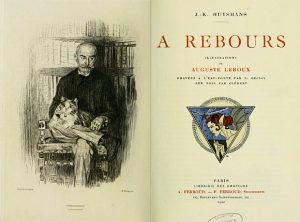
Posted by Anna van Gelderen on 31/5/2003
I found an interesting review written in 1923 on the occasion of the first English translation. Here’s an excerpt:
THE FREEMAN 10 January 1923.
“A Rebours” is a curious, ridiculous and puerile book which a few spirits will always cherish with an indulgent and amused affection. It lies embedded in the end of the nineteenth century like a jewelled and perfumed corpse, stiff, cold, putrescent, overladen with rigid and heavy colours. Dragged from its tomb, and set walking on the earth in the shroud of a new language, it looks pitifully antiquated in the fresher, freer, Stendhalian air of the twentieth century, and one need but glance upon it to see how far we really have moved from the ‘eighties and ‘nineties. Its introversion and melancholy seem the stuffy tag-end of Byronism, or the malady of Rousseau, filtered through Baudelaire; it is unpleasantly eaten with the sense of sin; and, after all, is there not something rather bourgeois about this hatred of the bourgeois? “A Rebours,” a hot-house and inverted “Walden,” an adventure in escape, is adolescent literature, and should be read for the first time at that age.
But there is a lure in the creeping undulation of Huysmans’s prose. Burdened as they are with mere information, the chapters contain passages that one will reread now and then. One of them is a prose poem describing the nature of the prose poem; another a paragraph on Mallarmé and then there are a few unequalled lines concerning the poetry of Verlaine. It is easy to understand how a generation found mirrored in des Esseintes its aspirations, tastes and hatred. In those days, charming days without doubt, one could take more or less seriously such words as satanism and decadence. It was the evening of the century,
Un soir fait de rose et de bleu mystique,
and the clear wind of Whitman had not yet blown across the European world, the war had not made men practical and modern, and Freud had not enlightened them. “A Rebours,” composed in revolt against the airless naturalism of Zola and his disciples, became the crystallization of a tendency, and as such is undoubtedly important from the standpoint of literary history. Moreover, the chapter on the Latin poets of early Christianity may have suggested to Remy de Gourmont the studies that resulted in “Le Latin Mystique.” But the tendency that fashioned “A Rebours” has expired; the more modern mind has rolled over to new styles and new variations of outlook upon life; and the book, three-fourths or eight-ninths claptrap, is irrevocably dead. But it is not without a certain feeling of regret that one bids it good-bye.
CLARKSON CRANE
~
Posted by moana on 31/5/2003, 21:56:27
Interesting review. Did anybody ever say anything good about this one? I mean, besides the French historians, teachers, and bourgeois-hating bourgeois?
I liked the description of the book in the first paragraph – as something lying cold and dead. It made me think of the turtle in the book – like the turtle, weighted down with so much ostentatious frill and frippery, the book takes a few clumsy steps forward and then collapses under its own weight, not to be awakened.
And I thought all French books were good 😉
~
Posted by Lale on 1/6/2003, 12:23:27
I like it. That’s one good review: “…is adolescent literature, and should be read for the first time at that age.” Maybe it was their “Catcher in the Rye”.
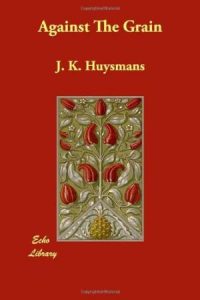
Posted by Rizwan on 2/6/2003, 19:49:28
I abandoned the book in mid-flight. Literally. I was flying in an airplane a few days ago where I was sure I would read “A Rebours” straight through. But then after about 60 pages or so, the flight attendant put on the utterly predictable “Maid in Manhattan” with J-Lo and Ralph Fiennes (we won’t discuss what a lousy actress J-Lo is, but what was someone as accomplished and talented as Fiennes thinking starring in this???).
Anyway, having to make the choice between the lesser of two evils (“A Rebours,” or Jenny from the Block pretending NOT to be yet another diva–now that is truly acting!), I opted for the one least taxing on the brain, the one with nobody named Des Esseintes in it. That’s how little I cared for this book.
Not that the experience came without some profit. Upon my return, having read that “A Rebours” was an inspiration for “The Portrait of Dorian Gray,” I promptly picked up a copy of Oscar Wilde’s “Selected Works,” and began reading through his stuff with much pleasure (Currently engaged with “De Profundis,” written by Wilde to his former lover while disgraced and humiliated, emotionally destroyed, financially ruined, and in jail. Pathetic and sad at the same time, but compelling to read).
I do have to confess one thing, though, about “A Rebours.” And I hesitate to say this before those of you who haven’t yet met me, for fear that you will now never want to meet me, but here goes anyway. Some aspects of “A Rebours,” of Des Esseintes, reminded me…of me! There, I said it. Yes, I saw some of myself in Des Esseintes.
Now, I don’t think I’m quite the reclusive, egocentric, jaded freak that Des Esseintes is (Please keep your comments to the contrary to yourselves ;-). But some of his ideas and feelings, I have to say…I’ve thought about them myself. Not all, by any means, but some.
For example, like Des Esseintes, I too have been, at times, “sapped by disillusionment, depressed by hypochondria…reduced to such a state of nervous sensitivity that the sight of a disagreeable person or thing was deeply impressed upon (my) mind…”
And as recently as last week, I caught myself detecting “such inverate stupidity…such contempt for literature and art and everything (I’ve) held dear, implanted and rooted in…mean mercenary minds, exclusively preoccupied with thoughts of swindling and money-grubbing…”
And then just this morning, trying to read Oscar Wilde on the subway in the midst of some loud, obnoxious tourists, I found myself hating “with all the hatred that was in (me)…the appalling boors who find it necessary to talk and laugh at the top of their voices…”
Anyway, so now I’m fearing that the real reason I disliked this book is because, well, because I think I am Des Esseintes, and Des Esseintes is me. 🙁
One more thing I would like to say about this book. One of you (can’t remember who, as I just read all the postings above in one sitting–a much more pleasurable reading experience than “A Rebours,” I might add)…
…Anyway, one of you mentioned something to the effect that this book was dated, that it achieved some fame when it was written because it resonated with some fashionable current of thought in its day, but now that this current has passed, the book has become somewhat obsolete. I think there is something to this. I also think the qualities of timelessness and universality–or lack of these things–are qualities that separate great artists and great works of art from mere poseurs and mere period pieces. Maybe this helps explain why Oscar Wilde is still widely read today, and why “A Rebours” needs a reference to Wilde’s “Dorian Gray” to inspire a similar reading.
~
Posted by Howard on 2/6/2003, 21:14:31
Just out of curiosity, was anyone inspired, like me, to read the Picture of Dorian Gray after finishing A Rebours?
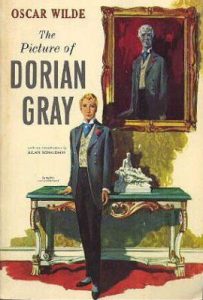

Posted by Guillermo Maynez on 3/6/2003, 0:07:01
I feel so lonely because I DID like this book. For me, it is a great divertimento, an eccentricity. Somehow I never got tired of the long listings of things and I even plan to read some of the books commented by Des Esseintes. I know I woudln’t recommend this book to any of my friends, since no one has the sense for this kind of eccentricity, but I can understand other people liking it. Just as Rizwan, I also felt identified with certain aspects of Des Esseintes’ personality. I also have this fantasy of suddenly making a lot of money and retiring to a nice house in the countryside, a house full of things I love. But I think my retirement would be interrupted by occasional gatherings with people I like. Ha! I happen to live in one the most crowded cities in the world, full of annoying people, and maybe that is why I have this fantasy.
Anyway, I felt comfortable within the environment of the book and I even liked the guy (except fot the most escatological issues). Huysman’s prose is strong and elegant. I would put this book in a sort of “periphery” of the Western canon, certainly a dated piece which has a chance of surviving only as long as other eccentrics keep reading it (and recommending it, dear Lale). Huysmans makes a great use of metaphors, especially in the chapter, a crazy one, dedicated to perfumes and smells. The idea of Dickens truning to Poe was great. It has a good creation of environments and of course is THE catalogue of the snob rich man.
I liked reading it, although I agree is a work very limited to a certain audience.
~
Posted by Anna van Gelderen on 3/6/2003, 10:47:18
Guillermo, I am glad there is finally a different voice and I am glad that you enjoyed reading the book. I think that most of us bookworms are able up to a certain point to identify with Des Esseintes’s wish to lock himself up in a pleasant house in the country and surround himself with beautiful artefacts and great books. And I, too, sometimes curse modern life, when I am trying to read or listen to the birds and some moron inflicts his/her inane telephone conversation on me.
However, it’s the sterility of Des Esseintes’s life, the arrogance of his attitudes and his misanthropy that I found unpalatable. What does he think of, looking down upon the rest of the world? He has never accomplished anything – even his deliberate attempt to lead an uncorrupted young man from the working classes astray fails.
~
Posted by Guillermo Maynez on 3/6/2003, 19:36:31
In response to Anna’s comments: of course Des Esseintes’s experiment is bound to fail. One can not be a human if one isolates him-herself absolutely from the rest of our kinship, however annoying or even dangerous they may be. Let’s remember another book about a recluse, only this one is involuntarily isolated. Mr. Robinson Crusoe finds himself stranded on a deserted island for many years. How does he cope with it? By doing practical things, not by lamenting his situation and getting depressed. Crusoe builds a shelter and little by little transforms it into a home. He speaks to himself, hunts, fishes, tries to build a raft to escape. He is a man of the world even in isolation. Otherwise, as he acknowledges in the book, he would have gone completely crazy. Des Esseintes, in a way, starts to suffer delusions, nightmares and the rest. He would probably have committed suicide at some point, bored to death. That is also why, just as the decadent experience was limited to a time and age, the Existentialist experiment became dead as well, even if some works it produced apparently are timeless (The Stranger by Camus comes to mind). Just as the decadents, the only possible solution for Existentialists is to commit suicide: if life does not mean anything at all, what the hell are you doing here contemplating this pathetic fact? But Existentialists contradict themselves: if nothing is worth nothing or means anything, why did you write your books? They are as meaningless as life.
The only Existentialist that understood this perfectly was Camus. Even for all the seemingly empty existence of The Stranger’s protagonist, in “The Plague” you see the value of human cooperation and sacrifice. But it is especially in his unfinished semi-autobiographical novel “The First Man” (“Le Premier Homme”) that the message of humanity, of learning to love and tolerate other people, really comes through. I urge you all to read that one.
I liked Huysman’s book, but I consider it an eccentricity I gave myself the chance to enjoy, especially last Sunday when I finished it in a magical, secluded spot under a canopy of tree tops in complete silence and isolation (interrupted later by a Soccer game on TV which I also enjoyed.
Posted by len. on 3/6/2003, 20:49:54
Guillermo remarks:
>Des Esseintes, in a way, starts to suffer delusions, nightmares and the rest. He would probably have committed suicide at some point, bored to death.
Indeed, as I reached the end of A Rebours that’s exactly what I was expecting.
>I liked Huysman’s book, but I consider it an eccentricity I gave myself the chance to enjoy
Likewise, though it was more of the “fascination with a train wreck” that seemed to keep me with it.
~
Posted by Lale on 3/6/2003, 23:15:35
We often see (in life and fiction) recluses who move to the country and refuse social life. They enjoy:
1. Nature : A view of the sea/mountain/river, their farm/garden, a walk in the woods, company of animals etc.
2. They have some contact with the locals. They usually do not consider the locals, the farmers, the peasants, the villagers, as a part of the society they want to escape.
This guy, doesn’t even talk to his servants. He thinks you can simulate travelling in your own bathroom.
And his taste… Please! Yes, I want to be surrounded by beautiful things but those beautiful things should be really beautiful, not a gem stone covered turtle.
Liquor sampling mechanism was ridiculous.
I imagined this guys house to be very very dark and oppressive. Most people run away from the city for fresh air, this guy locked himself up in a ridiculously and tastelessly decorated (and well sealed) box. Buried himself alive.
~
Posted by Christopher M on 4/6/2003, 5:14:01
I find this book quite extraordinary. I always love reading/seeing/hearing something that is completely original and personal. I think it matters very little if any of us actually finished reading A rebours. The style and content of this novel is absolutely unique, incomparable and ultimately memorable even if we hate it down to the last word. I’m always at awe when art is like that.
I find it interesting that Huysmans incorporates the style of the encyclopedia into that of the novel. He writes a lexicon of the objects that exist at the extreme limit of bourgeois desire/imagination. It is a dictionary of late-19th century kitsch.
I also find it interesting that Des Esseintes is only revealed to us through his objects. He is nothing without them, and (paradoxically) as many of you have mentioned, he is nothing with them, either.
~
- Related:
- Book Reviews


